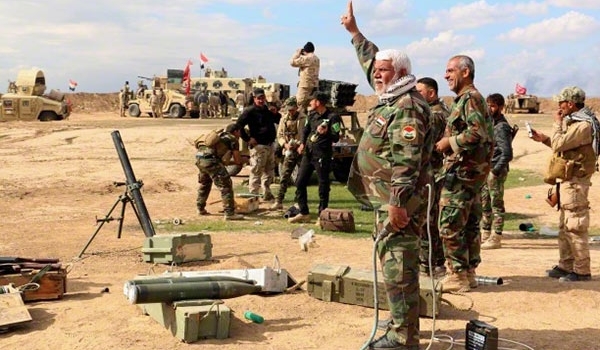
Iraq’s regular army is liberating Tikrit without Pentagon involvement and without any consultation with the US administration.
It is one of the biggest offensives yet against the terrorist group of ISIL, and Iraq isn’t going it alone. Iran is taking a key role in the offensive, backed by allied Sunni-Shia forces, artillery and air power. With the liberation of Tikrit going well, the US is still on the outside looking in, leaving the Pentagon complaining that Iran is taking their role as leader of the anti-ISIL war.
This has further irritated US officials, admitting that the Iraqis did not inform them in advance of the operation and have yet to request assistance. To do some damage control, they are now claiming that the battle could have a sectarian tenor – despite the fact that “allied Sunni-Shia irregular troops” have taken the lead!
Credible reports indicate Iranian military advisers are coordinating the attacks and helping them to operate artillery, rocket-launcher systems and surveillance drones. It’s all the reason why US Army General Martin Dempsey, chairman of the Joint Chiefs of Staff, says Iran’s involvement is a positive thing…
Still, those who destabilised the region for nefarious reasons and ignited the powder keg of sectarianism should take note:
1. Sunni and Shia irregular troops are fighting together to liberate Tikrit, which is a Sunni-dominated town. Repeat, Sunni and Shia volunteer forces are sacrificing their lives to help liberate a Sunni-dominated area. This is not a sectarian battle or proxy warfare to assert hegemony over neighbors. It’s a battle against ISIL and its evil ideology. Else, Iran would have never bothered to take the lead.
2. Under a special political arrangement, good governance is the ensuing strategy. Once the allied forces evict the death cult, a local government will be formed to involve all the inhabitants of the city, regardless of their ethnic, religious and ideological differences. They will control and manage their areas while the army and allied forces continue their next push: Liberation of Mosul. The large-scale progress will not result in sectarianism.
3. For those who claim it is not the military but the political consequences of the fighting that worry them, it suffices to remind that the Iraqi government and parliament comprise of Sunni, Shia and Kurdish politicians and representatives. Subsequently, liberation is not dead on arrival as the central government has begun promoting good governance. The liberated cities and towns will accept rule by a central government. This is not a long shot.
Indeed, the Iraqis have what it takes to liberate their country and enhance democratic governance and human rights, particularly when it comes to promoting Sunni-Shia participation in security, encouraging transparency and accountability, and addressing reform and leadership.
As for those who cannot stand the idea that Iran is now the leader of the anti-ISIL war, the message is this: Iran is now the leader of the anti-ISIL war and there is little Washington can do to influence the course of events.
Iran has become the preeminent strategic player in the region to the increasing disadvantage of the US and its allies. And it is not just Iraq that finds Iran a preferable ally. Syria also finds Iran a preferable ally, which means the liberation of Iraq will be followed by the liberation of Syria.







